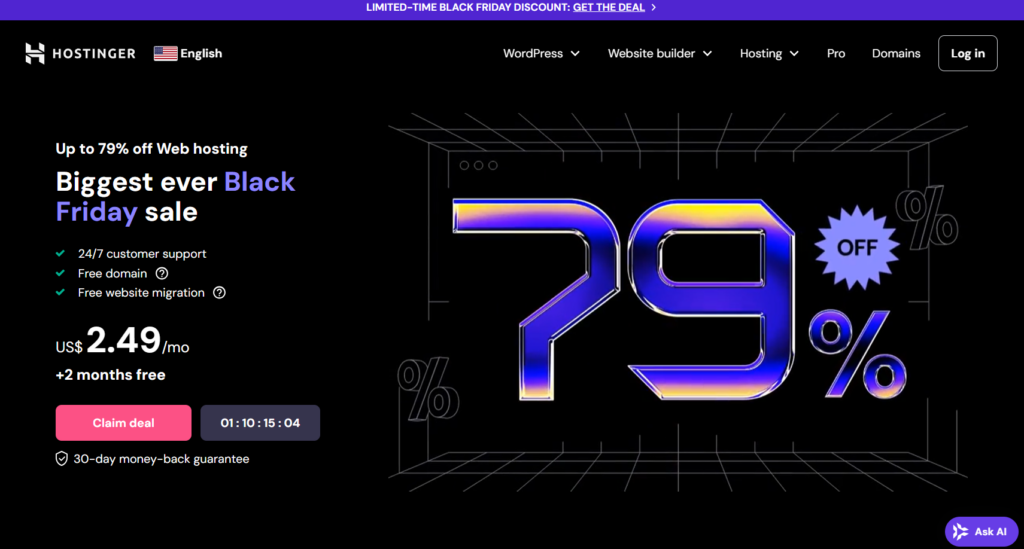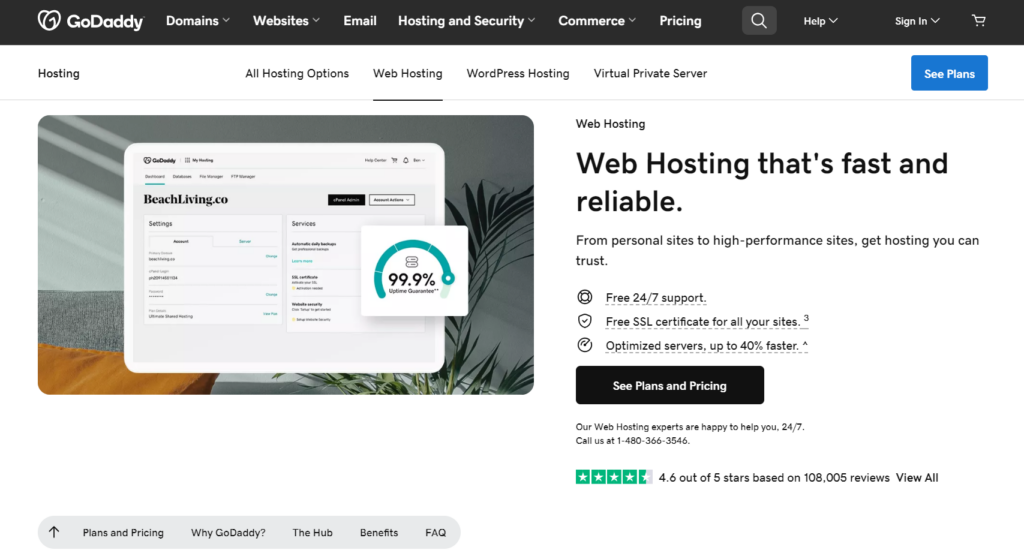Table of Contents
Our Verdict

As you decide between Hostinger and GoDaddy for web hosting, consider your priorities. If affordability and strong performance are key, opt for Hostinger. Their shared hosting plans are budget-friendly, delivering excellent uptime and speed—perfect for small businesses or personal projects.
On the other hand, if you seek a comprehensive service from a well-established provider, GoDaddy is the way to go. It offers a wide range of hosting options, including domain registration, along with a robust customer support system to assist you.
Also, think about your technical expertise. Hostinger’s user interface is simple and ideal for beginners, while GoDaddy provides more features for advanced users. For scalability, both platforms have options, but GoDaddy shines with its variety of plans that can grow with your needs.
In summary, choose Hostinger for cost-effectiveness and performance, or GoDaddy for a broader range of services and strong support. Evaluate your specific needs, compare features, and make your choice. Regardless of your decision, you’ll be setting yourself up for a reliable hosting experience.
Why Choose Hostinger
MORE >>> Volusion Website Builder Review
Who Hostinger Is Best For
Choose Hostinger if you:
- Are looking for affordable hosting plans without compromising on quality, Hostinger is an excellent choice.
- Value speed and uptime, Hostinger delivers impressive speed and reliability, ensuring your site runs smoothly.
- Need to manage several websites, their plans allow for easy management of multiple domains.
- Appreciate responsive customer service, Hostinger offers 24/7 support to assist you with any issues.
- Anticipate growth, Hostinger’s plans are designed to scale with your needs, making it easy to upgrade as your business expands.
Who Hostinger Is Not Right For
Avoid Hostinger if you:
- Need advanced tools and features like powerful website builders or extensive integrations, you might find Hostinger lacking.
- Prefer a well-known brand and long-standing trust are crucial for you, GoDaddy or other established providers may be a better fit.
- Require specific types of hosting, like dedicated servers or advanced VPS hosting, you might want to explore other options.
- Prioritize premium support channels or dedicated account management, you may find Hostinger’s support limited compared to higher-end services.
- Anticipate very high traffic or resource-intensive applications, you might need a more robust hosting solution.
- Require a Windows hosting environment, Hostinger primarily offers Linux-based options.
Why Choose GoDaddy Web Hosting
Who GoDaddy Web Hosting Is Best For
Consider GoDaddy Web Hosting if you:
- Need an intuitive interface that’s easy to navigate, even if you’re a beginner.
- Want a host known for its consistent uptime and performance, ensuring your website is always accessible.
- Appreciate 24/7 customer support via various channels, including phone and chat.
- Prefer a provider that offers domain registration, hosting, and additional services like website builders in one place.
- Anticipate growth and want to host plans that can easily scale with your increasing traffic and resource needs.
- Are looking for competitive pricing and introductory offers to help manage costs, especially if you’re just starting.
- Want optimized hosting specifically for WordPress, with features that enhance its performance and security.
Who GoDaddy Web Hosting Is Not Right For
Ignore GoDaddy Web Hosting if you:
- Require extensive control over server settings or custom configurations that GoDaddy may not offer.
- Prioritize a provider that specializes in high-performance or cloud hosting solutions for resource-intensive applications.
- Dislike potential renewal rate increases and prefer transparency in long-term pricing.
- Need a hosting provider with data centers in specific geographic locations to comply with regulatory requirements.
- Want a provider that doesn’t heavily promote additional services or upsells during the purchasing process.
- Are an advanced user or developer seeking features typically found in dedicated or VPS hosting environments.
- Want a hosting provider with a strong commitment to sustainability and environmentally friendly practice.
Main Differences
Pricing
Hostinger offers more affordable plans compared to GoDaddy. Its shared hosting plans are particularly budget-friendly. While GoDaddy’s pricing can be higher, especially for its premium plans. However, it often had promotional offers and discounts available.
Features
Hostinger provides a variety of features, including free SSL certificates, automatic backups, and a cPanel control panel. It offers additional features like Cloudflare CDN and LiteSpeed web server.
GoDaddy also offers a range of features, including free SSL certificates, automatic backups, and a cPanel control panel. It also has additional features like DDoS protection and managed WordPress hosting.
Performance
Hostinger is known for its fast and reliable performance. It has data centers located around the world and uses advanced technology to ensure optimal website speed.
GoDaddy also offers good performance, but their speed can vary depending on the plan and location. It has data centers in multiple regions.
Customer Support
Hostinger provides 24/7 customer support through live chat, email, and ticketing. It has a knowledge base and community forums as well. GoDaddy also offers 24/7 customer support through live chat, email, and phone. It has a comprehensive help center and community forums.
Target Audience
Hostinger is a good choice for you if you’re budget-conscious or you run a small business. However, if you need something that caters to a wider range of users, including individuals and large enterprises, GoDaddy could be a better fit.
Keep in mind that, both Hostinger and GoDaddy are reputable web hosting providers with their strengths and weaknesses. The best choice for you will depend on your specific needs and budget. It’s recommended to compare their features, pricing, and performance to find the best fit for your website.
Standout Features
Hostinger Standout Features
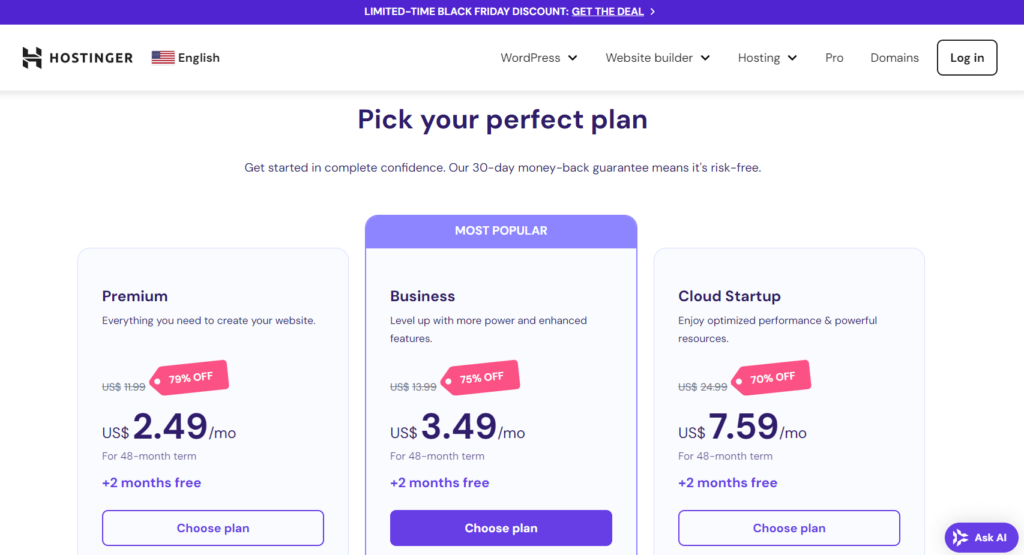
Lightning-Fast Speeds
Choose Hostinger for its impressive server performance. It utilizes advanced technology to ensure your website loads quickly, keeping visitors engaged.
Affordable Pricing
Take advantage of their budget-friendly plans. Hostinger offers great value without compromising on features, perfect for both beginners and small businesses.
User-Friendly Interface
Dive into their intuitive control panel. It’s designed for ease of use, so you can manage your website effortlessly, even if you’re not tech-savvy.
24/7 Customer Support
Rely on their round-the-clock support team. Whether you have questions or need help troubleshooting, they’re always ready to assist you.
One-Click App Installations
Simplify your setup process with one-click installations for popular apps like WordPress. Get your site up and running in no time!
Free Website Migration
If you’re moving from another host, enjoy free migration services. Hostinger makes the transition smooth and hassle-free.
Robust Security Features
Protect your website with built-in security measures. Hostinger includes SSL certificates and daily backups to keep your data safe.
PRO TIPS >>> Beaver Builder WordPress Page Builder Review
GoDaddy Web Hosting Standout Features
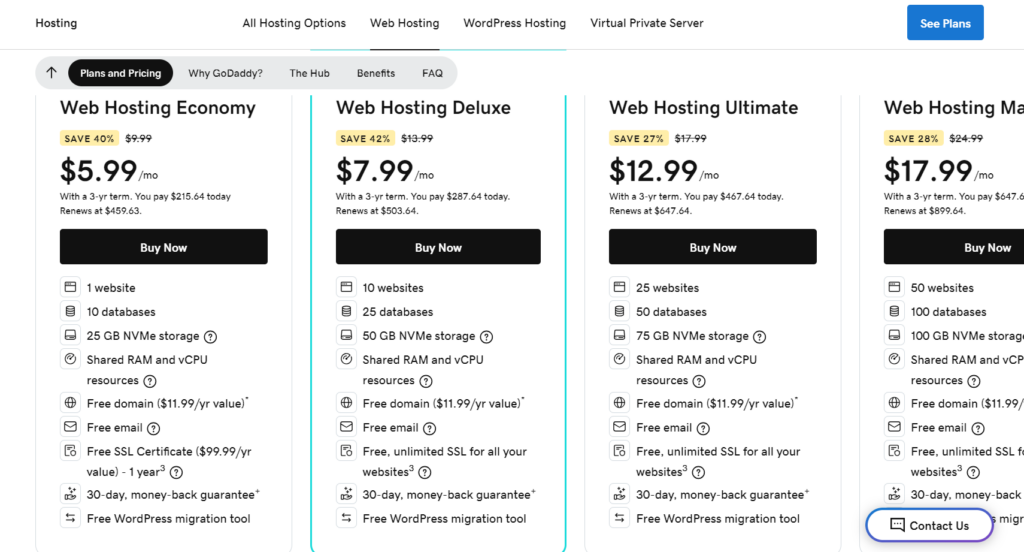
Reliable Uptime and Performance
GoDaddy boasts a 99.9% uptime guarantee, ensuring that your website remains accessible to visitors almost all the time. This reliability is crucial for your business if it depends on online presence.
Award-Winning Customer Support
One of the standout aspects of GoDaddy’s service is its 24/7 customer support, which is recognized for its quality. Customers can reach out for help via various channels, including SMS, allowing for convenient and immediate assistance at any time of day or night.
E-commerce and Marketing Tools
GoDaddy offers specialized packages tailored for e-commerce businesses, which include essential tools for online selling. Additionally, it provides marketing services that can help your business enhance its online visibility and reach potential customers effectively.
User-Friendly Setup
The hosting service features a one-click setup process that simplifies the initial stages of launching a website. This is particularly beneficial for you if you’re a beginner who may not have extensive technical knowledge.
Comprehensive Hosting Plans
GoDaddy provides a range of hosting plans that cater to different needs, from single projects to multiple sites. This flexibility allows you to choose a plan that best fits your specific requirements.
Performance Optimization
GoDaddy’s hosting services are designed to fuel business growth, with features that optimize website performance. This includes fast loading times and the ability to handle varying traffic levels effectively.
Pros and Cons of Hostinger
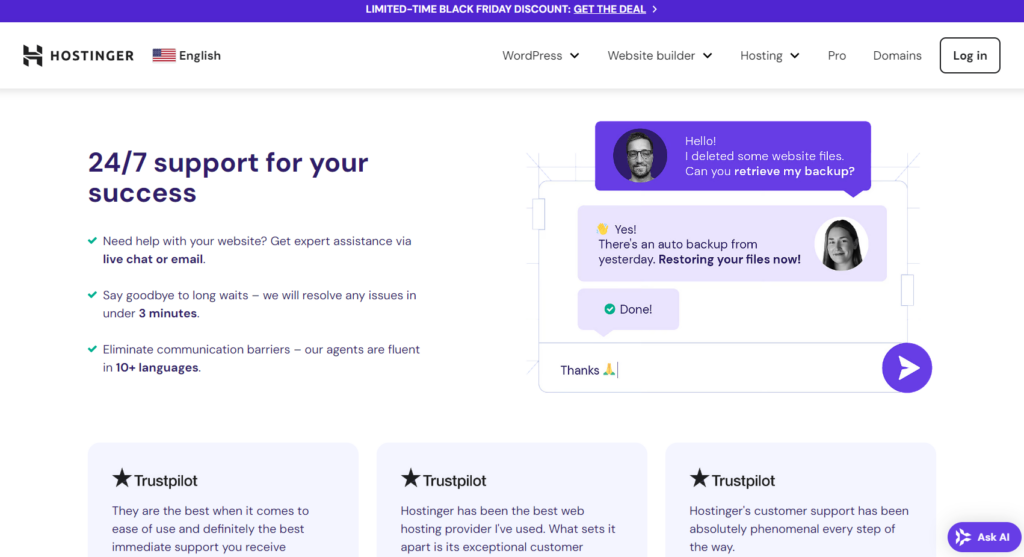
Pros
- Provides some of the most competitive prices in the web hosting market, making it accessible for individuals and small businesses.
- Ensures excellent performance with high-speed servers and caching technology, leading to quicker loading of websites.
- Uses a custom control panel (hPanel) that’s easy to navigate, even for beginners, making site management straightforward.
- Offers a free domain and SSL certificate with most plans, enhancing security and reducing additional costs.
- Features 24/7 customer support via live chat, providing timely assistance for technical issues.
- Allows you to try their services risk-free, with a hassle-free refund if you’re not satisfied.
Cons
- Offers daily backups only on higher-tier plans, requiring users on basic plans to manually back up their data or upgrade.
- Restricts CPU and memory usage on cheaper plans, which might not be suitable for websites with high traffic.
- Provides additional features like priority support and enhanced security at an extra cost, which could add up.
- Experiences occasional downtime, though generally minimal, which can be a concern for sites needing constant availability.
- Presents a custom control panel that might be unfamiliar to those used to cPanel, requiring a brief adjustment period.
Pros and Cons of GoDaddy Web Hosting
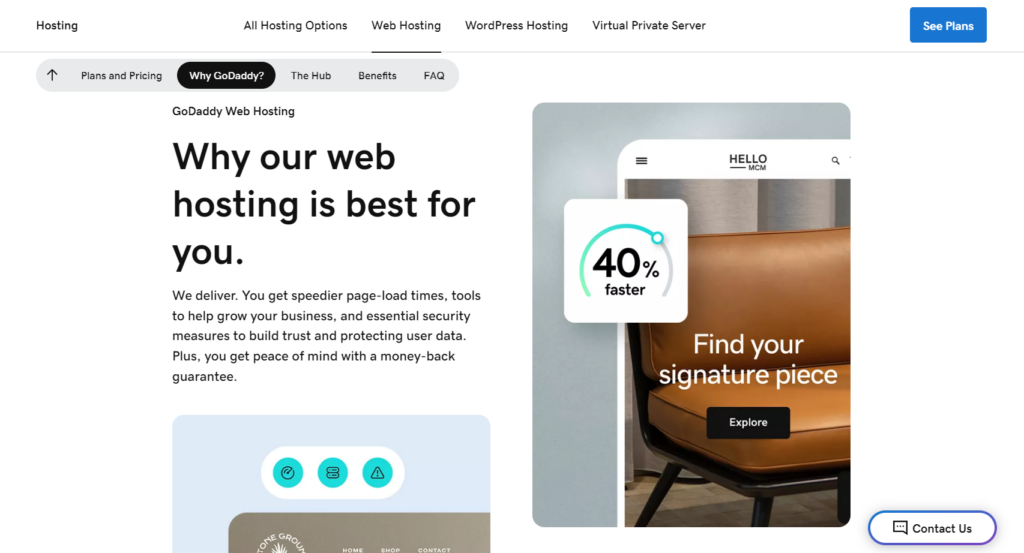
Pros
- Provides various hosting plans, including shared, VPS, and dedicated hosting, catering to different needs and budgets.
- Simplifies the process of managing domains and hosting under one platform, making it convenient for users.
- Delivers reliable uptime performance, ensuring your website remains accessible most of the time.
- Offers an intuitive website builder with drag-and-drop features, allowing easy site creation even for beginners.
- Provides around-the-clock support via phone, live chat, and email, assisting users with technical issues promptly.
- Simplifies app installations, such as WordPress, with just one click, speeding up the setup process.
Cons
- Charges additional fees for services like SSL certificates and backups, which are often included in other hosting plans.
- Restricts resources like storage and bandwidth on lower-tier plans, which might not be sufficient for growing websites.
- Shows slower page loading speeds compared to some competitors, potentially affecting user experience and SEO.
- Engages in frequent upselling during the purchase process, which can feel overwhelming for customers.
- Experiences inconsistent customer support quality, with some users reporting delayed or less helpful responses.
GET SMARTER >>> Salesforce Commerce Cloud E-commerce Platform Review
Customer Reviews
Users love Hostinger for its super affordable prices without skimping on performance. People talk about how fast their websites load and appreciate the reliable uptime, especially considering the price point. The intuitive control panel gets a lot of praise, especially from beginners who don’t want to deal with something overly complicated. And when issues pop up, Hostinger’s customer support usually gets a thumbs up for being friendly, quick, and effective.
Meanwhile, GoDaddy gets mixed reviews. People like the brand recognition and the fact that it’s a one-stop shop for domains, email, and hosting. Some users find GoDaddy’s interface easy to navigate, but many aren’t thrilled with the pricing, feeling like they’re constantly being upsold on features that should be included. There are frequent complaints about GoDaddy’s support being inconsistent—sometimes you get great help, and other times you’re stuck in long waits with reps who don’t seem to solve the problem.
Overall, customers who want a straightforward, budget-friendly option with solid performance and reliable support often rave about Hostinger. In contrast, those who choose GoDaddy usually do so for the convenience of having everything in one place, but it’s clear from reviews that they’re not always thrilled with the value for the price.
Competitors
Bluehost
Known for its beginner-friendly setup, excellent customer support, and a wide range of hosting options. It’s also officially recommended by WordPress.
SiteGround
Offers top-notch speed and security features, making it ideal for businesses and those who prioritize performance. It’s well-regarded for its excellent customer service.
DreamHost
Provides solid performance with a focus on privacy and strong uptime guarantees. DreamHost is also WordPress-recommended and is popular for its flexible pricing.
IONOS
Focuses on affordability, scalability, and security, making it a great choice for small businesses and professionals.
Wix
Though primarily a website builder, Wix offers hosting services that cater to users who prefer an all-in-one solution with a focus on design flexibility.
Pro Tips
- Take advantage of Hostinger’s easy Cloudflare integration to enhance security, improve speed, and protect against DDoS attacks. It’s a simple way to boost your site’s resilience and performance.
- Always keep your CMS, themes, and plugins updated to avoid vulnerabilities. Hostinger’s auto-update feature is great, but always double-check after updates to ensure compatibility.
- Before making major changes to your site, use Hostinger’s staging environment to test everything. This avoids disrupting your live site with faulty updates or plugin conflicts.
- Protect your Hostinger account with 2FA. It’s an extra layer of security that’s quick to set up and keeps your site safe from unauthorized access.
- Don’t hesitate to use GoDaddy’s 24/7 support. Whether it’s live chat, phone, or forums, their support can quickly help you resolve technical issues or provide guidance on features.
- Ensure that automatic backups are enabled. This keeps your data safe and ensures that you can easily restore your site if something goes wrong during updates or modifications.
- Keep an eye on your resource usage (CPU, RAM, etc.). GoDaddy’s dashboard provides insights into what’s being consumed; if you’re consistently hitting limits, consider upgrading your plan to maintain optimal performance.
Recap
When comparing Hostinger and GoDaddy for web hosting, focus on what matters most—performance, cost, and support. Hostinger shines with its affordable pricing, faster load times, and beginner-friendly interface, making it ideal for those on a budget or new to web hosting. GoDaddy, on the other hand, offers a wider range of services, including domain registration and marketing tools, but its hosting plans can be pricier. GoDaddy’s customer support is reliable, but Hostinger’s 24/7 live chat support is often more responsive. Ultimately, choose Hostinger for speed and value, while GoDaddy suits those needing an all-in-one solution with a larger budget.



